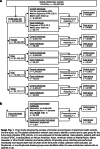Increased cardiovascular risks and mortality in prurigo nodularis: a global cohort study
- PMID: 38631094
- PMCID: PMC11035034
- DOI: 10.1016/j.ebiom.2024.105123
Increased cardiovascular risks and mortality in prurigo nodularis: a global cohort study
Abstract
Background: Prurigo nodularis (PN) presents with intensely itchy hard nodules. Despite being limited to the skin, PN was noted to be associated with systemic diseases including diabetes and chronic renal failure. In previous smaller retrospective studies, several cardiac and vascular diseases were found more frequently in patients with PN. However, small cohort sizes, partially discrepant outcomes, missing data, and incomplete risk assessment limit these findings.
Methods: Electronic health records (EHR)s of 64,801 patients (59.44% females) with PN and an equal sized propensity-matched control group were retrieved. In these cohorts, the risks to develop cardiac and vascular diseases and mortality following the diagnosis of PN were determined. Sub-analyses included stratification for sex, ethnicity, and treatments.
Findings: PN was associated with a higher risk for a broad range of acute cardiac events including heart failure and myocardial infarction. For example, the hazard ratio of myocardial infarction was 1.11 (95%-CI: 1.041-1.184, p = 0.0015) following PN diagnosis. Also, all-cause mortality was higher in patients with PN. Further, chronic vascular as well as structural heart diseases, e.g., peripheral arterial disease, chronic ischaemic heart disease and valval disorders were found more frequently following a PN diagnosis. Risks were more pronounced in white and female patients. Having established an increased risk for death and cardiovascular disease, we next addressed if dupilumab that has been recently licenced for use in this indication can modulate these risks. The risk of death but not of any cardiovascular disease was slightly reduced in patients with PN treated with dupilumab as opposed to those treated with systemic therapies other than dupilumab. The study is limited by retrospective data collection and reliance on ICD10-disease classification.
Interpretation: PN is associated with higher mortality and an increased risk for the development of a wide range of cardiac and vascular diseases. Health care professionals should take this into account when managing patients with PN.
Funding: This work was supported by the University of Lübeck, the Deutsche Forschungsgemeinschaft and the State of Schleswig-Holstein.
Keywords: Cardiovascular disease; Mortality; Myocardial infarction; Prurigo nodularis; Stroke; TriNetX.
Copyright © 2024 The Author(s). Published by Elsevier B.V. All rights reserved.
Conflict of interest statement
Declaration of interests The authors declare that this study was designed and conducted in the absence of any financial or commercial relationships that could be construed as a potential conflict of interest. HZ received travel honoraria and support for meeting attendance from TriNetX, Pfizer, UCB Pharma, Almirall and Janssen unrelated to the current work.
Figures






References
-
- Kwatra S.G. Breaking the Itch-Scratch Cycle in prurigo nodularis. N Engl J Med. 2020;382(8):757–758. - PubMed
-
- Misery L. Chronic prurigo. Br J Dermatol. 2022;187(4):464–471. - PubMed
-
- Huang A.H., Williams K.A., Kwatra S.G. Prurigo nodularis: epidemiology and clinical features. J Am Acad Dermatol. 2020;83(6):1559–1565. - PubMed
-
- Williams K.A., Huang A.H., Belzberg M., Kwatra S.G. Prurigo nodularis: pathogenesis and management. J Am Acad Dermatol. 2020;83(6):1567–1575. - PubMed
-
- Singam V., Patel K.R., Silverberg J.I. Association of prurigo nodularis and lichen simplex chronicus with hospitalization for mental health disorders in US adults. Arch Dermatol Res. 2020;312(8):587–593. - PubMed
MeSH terms
LinkOut - more resources
Full Text Sources

